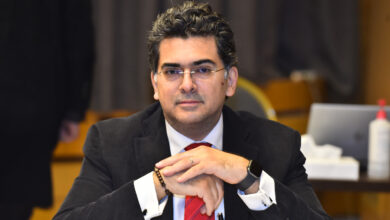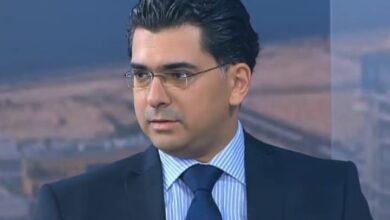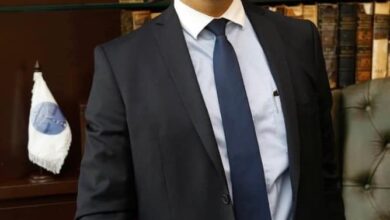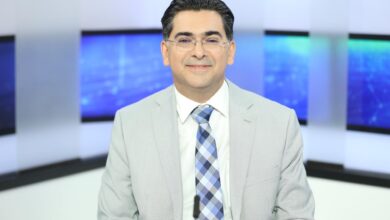PRESIDENT AOUN DISCUSSES FINANCIAL AND ADMINISTRATIVE REFORMS WITH DISPLACED MINISTER, MEETS SOCIAL AND ENVIRONMENTAL COUNCIL DELEGATION, MP AZAR, FORMER MINISTER SARRAF | 27 Apr, 2022

PRESIDENT AOUN DISCUSSES FINANCIAL AND ADMINISTRATIVE REFORMS WITH DISPLACED MINISTER, MEETS SOCIAL AND ENVIRONMENTAL COUNCIL DELEGATION, MP AZAR, FORMER MINISTER SARRAF
NNA – President of the Republic, General Michel Aoun, devoted today’s meetings to address economic affairs. Emphasis was on the need to address difficult financial and economic problems as a beginning point for Lebanon’s gradual recovery, in addition to continuing negotiations with the International Monetary Fund according to previously agreed principles foremost of which is adoption of reforms and practical measures.
The President affirmed that he believes in the resurrection of Lebanon, and is working for this matter, calling for cooperation to reach this end for the benefit of the Lebanese. President Aoun hoped that the next President of the Republic will work according to a clear map whose points have been identified.
President Aoun also pointed out that there are those who manipulate financial issues and the dollar exchange rate, which negatively affects citizens, in light of “Reports by local and international specialists indicating the presence of parties whose goal is to exacerbate the situation, including those in a position of power, and this is what we suffer from”.
Displaced Minister:
The President met Minister of the Displaced, Issam Sharaf El-Din, and members of the National Economy Support Committee, Dr. Paul Morcos and Mr. Hikmat Noueihed.
During the meeting, President Aoun was briefed on a study prepared by the committee related to financial and administrative reforms and how to reduce public debt.
Statement:
After the meeting, Minister Sharaf el Din made the following statement:
“We had the honor to visit His Excellency the President of the Republic. We were accompanied by members of the Committee to Support the National Economy.
This committee was formed in the absence of the Shiite duo when we did not meet for two months. During this period, we were developing economic studies on reducing the public debt, which we consider a basic solution.
We dealt with these files in the smallest details and there was a response from His Excellency the President, especially that this would comfort the citizen.
It is also possible to approve the investment of state assets to reduce the public debt by 40 billion dollars. There is also an item related to placing shares for depositors in banks, which could reduce 20 billion dollars of state debts. We will go into the details of this approach, God willing, more and more.
During the meeting, we also discussed the issue of the return of displaced Syrians, and we handed His Excellency a file, and God willing, he will follow up with international references in cooperation with the Prime Minister and the Council of Ministers.
We also talked about the issue of transforming the Ministry of the Displaced into a Ministry of Rural Development, which has become a patriotic need which helps through activities within the ministries to build the nation”.
Questions & Answers:
Question: Did you sense that there is a serious approach to the issue of the displaced by foreign countries, especially after what happened yesterday in the Council of Ministers, when the President raised this issue seriously?
Answer: “Of course, His Excellency the President raised this issue yesterday, and he is presenting a practical and basic project that demands the United Nations to grant the displaced Syrians their allowances on Syrian lands, and this is the most important item that was touched upon and it is very valuable, while giving guarantees from the Syrian side that the return would be safe and sound”.
President of the Economic Council:
President Aoun received the President of the Economic, Social and Environmental Council, Charles Arbid, accompanied by a delegation from the Council’s Bureau.
The economic situation and the role that the council plays in finding solutions to the financial and economic crisis were discussed.
Mr. Arbid had thanked President Aoun for receiving the delegation, and for signing the law to modernize the Economic and Environmental Council, which has become effective, “Opening an important door for participation and dialogue between the productive forces”.
Arbid stressed the continuation of work in everything that would enhance and activate production in Lebanon, placing the council at the disposal of President Aoun and the Lebanese officials to express their opinion on all issues of an economic and environmental nature.
Mr. Arbid also raised the issue of liquidity in the Lebanese pound and its negative impact on the economic situation, especially since the lack of liquidity limits consumption and demand for local and foreign products, which means a decline in the general economic situation, which is already suffered from, calling for activating dialogue in this regard.
Then the head of the General Labor Union, Beshara Al-Asmar, addressed the return of the workers who were dismissed from the port of Beirut, thanking President Aoun for his follow-up and sponsorship of this issue, which brought the workers back to their workplaces.
Al-Asmar pointed out that what was approved for the public sector and the private sector, has not yet taken its way to implementation, which is a problem for workers and employees.
Al-Asmar also appealed the President for his patronage and support to establish a dialogue with economic bodies and the Economic and Social Council to develop financial and social grants.
The Secretary-General of the General Labor Union, Saad El-Din Hamidi Saqr, indicated the need to address the shortage of chronic and intractable medicines, and the suffering of citizens in this area to obtain the medicines they need to survive.
For his part, Mr. George Nasraoui agreed with Mr. Arbid in stressing the importance of liquidity in pounds, and focused on what the industry sector suffers from in the current circumstances that require it to pay high costs to secure its continuity and meet the conditions set by countries to allow the export of Lebanese industries.
Mr. Salah El-Din Oseiran, pointed to the danger of commodity price inflation, which contributes to social instability, which is something that must be taken into account. Oseiran also focused on how to take advantage of the positive steps that were recorded, including the signing of a Saudi-French agreement to support Lebanon yesterday and the need to adopt the necessary steps to advance negotiations with International Monetary Fund.
Finally, Youssef Bassam touched on the problems faced by the professors and students of the Lebanese University, and the need to address them, because they are now threatening their fate on the one hand, and the fate of the university in general.
President Aoun:
The President welcomed the delegation, and considered that the problems and difficulties raised by the delegation members can be summed up by the necessity of having money, noting that there are those who manipulate financial issues and the dollar exchange rate, which negatively affects the citizens.
Moreover, President Aoun pointed out that this issue is being discussed and studied by officials who are working to find solutions and on common denominators with the International Monetary Fund to push the negotiations forward.
In parallel, the President indicated that this situation throws its weight on other situations, especially the security situation in which we are witnessing some unacceptable cases that are taking place, and attacks that warn of fear of further deterioration, so we gave directions to the security forces to play their full role and work to limit these violations and attacks.
The President also stressed that work is being done to “Activate issues of dialogue with the relevant forces to reduce the crisis situation on the one hand, and to strengthen issues of legislation that would help limit the financial and economic deterioration, in light of reports by local and international specialists indicating the existence of parties whose aim is to aggravate the situation, including those in power, and this is what we suffer from”.
“I had previously warned against the disadvantages of continuing the rentier economy, and the financial and economic policy that Lebanon was pursuing before reaching the tragic situation that we are currently experiencing” President Aoun said.
On the other hand, President Aoun stressed the financial and economic problems that the presence of the displaced Syrians on Lebanese soil poses, and that foreign countries contribute to keeping them in Lebanon by providing them with money where they are, rather than after their return to their country to help them restore their lives.
“Alleging that they are awaiting a political solution in Syria, cannot be accepted in light of the density of population in Lebanon, which has reached 600 people per square kilometer, because the political solution has proven in more than one country that it is long-term and may not be achieved, similar to what happened in Cyprus and Palestine. It is necessary to work on the return of the displaced to Syria, especially since security has become available there” the President continued.
President Aoun then affirmed that he believes in the resurrection of Lebanon, and is working for this matter, calling for cooperation to reach this end for the benefit of the Lebanese.
The President hoped that the next President of the Republic will work according to a clear map whose points have been identified.
Statement:
After the meeting, Mr. Arbid made the following statement:
“We were honored today to meet His Excellency the President.
We addressed numerous topics, including updating the Law of the Economic, Social and Environmental Council, and our desire to cooperate more with the three presidencies, especially with the Council of Ministers, so that we, as an economic council, can give our opinion on economic and social issues, which are numerous, in light of the great crisis we are living in.
We also tackled the issue related to the required discussion about laws, especially with regard to “Capital Control” and others. The discussion on this issue must be more participatory so that all segments of society can participate in a subject that concerns all Lebanese, and God willing, this will soon be opened. The discussion will lead to a solution acceptable to all, and the legislation will go towards easing this conflict around it.
The issue of liquidity scarcity in the national currency was also addressed. We consider this issue essential, as what is required is to improve this situation, because the lack of liquidity means a lack of consumption, which leads to a scarcity in production, and this directly affects our economy.
The social reality and social changes are basic issues that we are working to find solutions to. Social affairs are the basis, such as poverty, immigration and unemployment. This is what concerns us as a social economic council, and we are ready to cooperate with everyone for the common national interest”.
Questions & Answers:
Regarding the “Capital Control” and the council’s opinion in finding an alternative to it, especially since it was linked to the issue of the financial recovery plan and the discussion with the World Bank, Arbid pointed out that the common mistake is to link all these issues together.
“Capital control is one thing, the recovery plan is another, and the projects proposed for lifting banking secrecy is another. Here we see the lack of a participatory process and participatory discussion on this subject. Every team goes in a direction, and there is a clash in politics. We say that we are not the first country to adopt capital control, knowing that we are late in doing so, but in order to be able to reach a common formula, we must open discussion about matters of interest to citizens, their future and the future of their children, their savings and their money” Arbid said.
“We in the Economic Council have unions, they have compensation funds, and these unions are also involved in the discussion. And all of this requires a participatory process of discussion in depth and frankly between each other, and this is what we strive for, and God willing, soon there will be space for this discussion and we will raise several proposals to the Representatives and to the Speaker of Parliament in order to reach a process that is closer to something acceptable to everyone, especially if we talk to each other calmly and away from politics. Let them leave politics to the politicians, but the people’s affairs and their sorrows are for us the most important” Arbid concluded.
MP Azar:
President Aoun received MP Roger Azar and discussed with him current political situation and recent developments.
MP Azar pointed to the need to issue organizational decrees for the law establishing the Kesrouan Governorate, Jbeil, which was approved by the Parliament since 2017, and the decrees have not been issued to date.
“The people of Kesrouan and Jbeil are wondering about the reasons that prevent the adoption of these decrees, especially since the current economic and financial conditions have imposed a reduction in the cost of citizens’ transportation to the Governorate of Mount Lebanon in Baabda to complete their transactions” MP Azar said.
“I discussed with His Excellency the necessity of completing the implementation of the development projects that work began on years ago, and completion was delayed, most notably the port of Jounieh, and the need to speed up its completion before the onset of winter” MP Azar concluded.
Former Minister Sarraf:
The President met former Minister Yaacoub Al-Sarraf and discussed with him the situation in Tripoli and the north after the recent developments.
The reform plan prepared by the government was addressed in the meeting, as well as development projects in the Akkar region, most notably the military hospital project in Halba, and the exclusive economic zone. — Presidency Press Office




